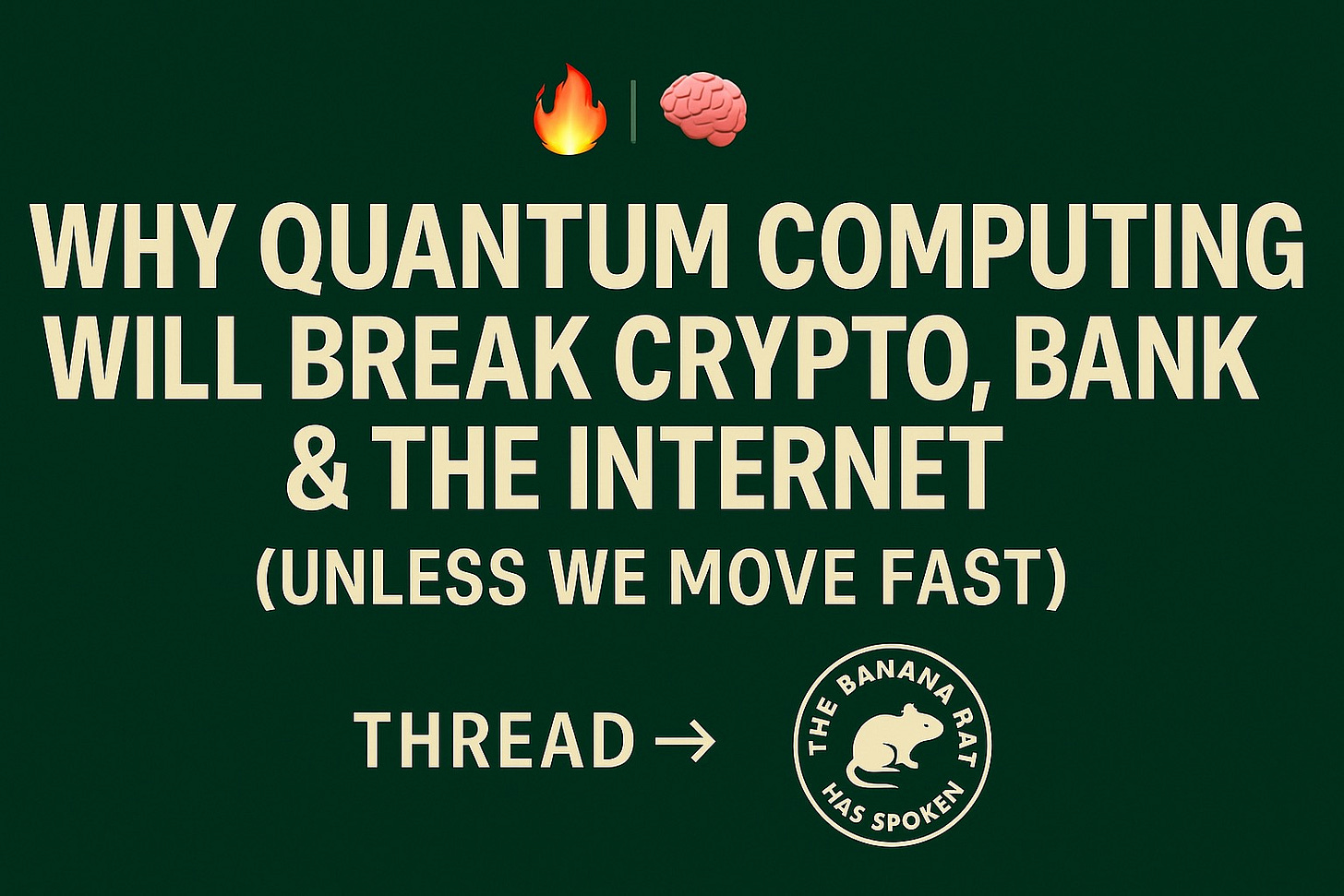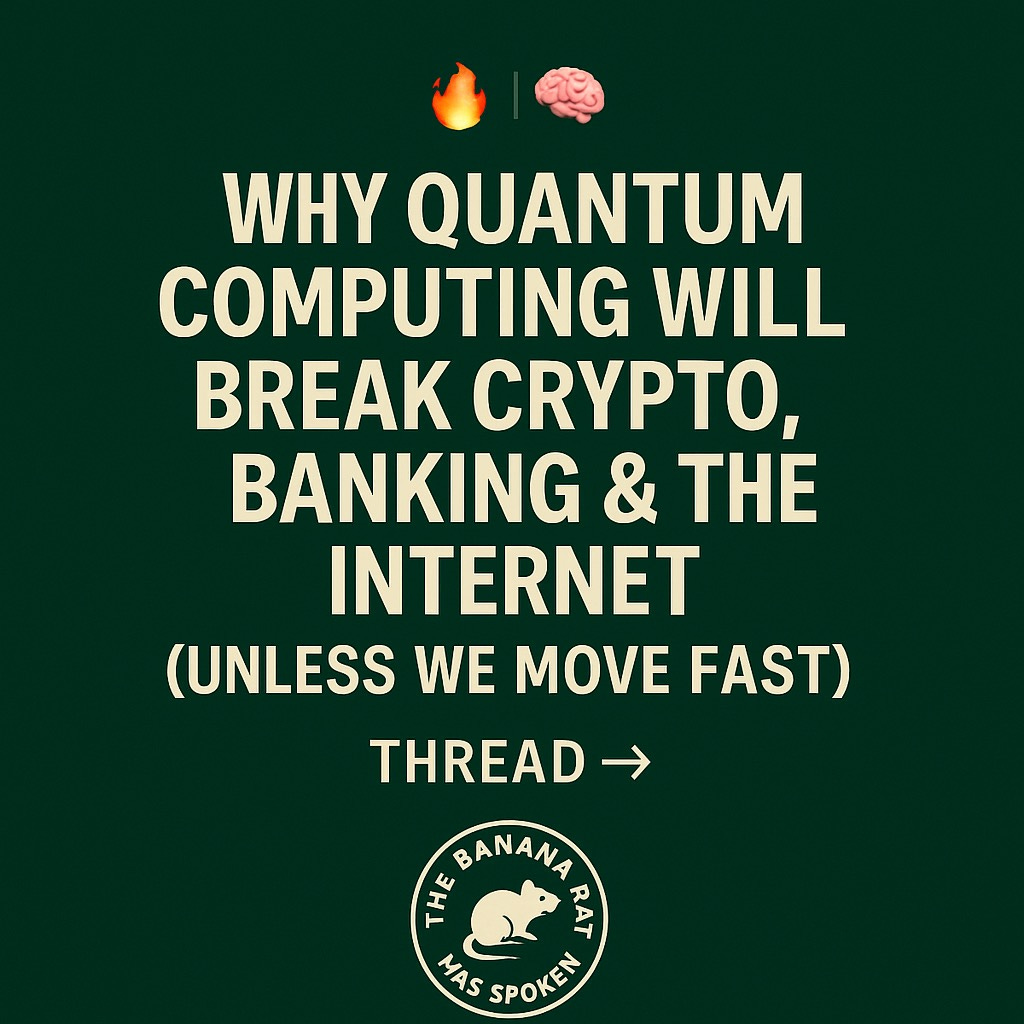Why Quantum Computing Will Break Crypto, Banking & the Internet
Why Quantum Computing Will Break Crypto, Banking & the Internet
(Unless We Move Fast)
A cryptographic reckoning is coming.
The vaults of the digital economy are vulnerable.
And most institutions are still sleeping with the door wide open.
🧩 Setting the Stage
Everything we do online—from signing contracts to storing health records to buying NFTs—relies on one invisible system: encryption. But quantum computing threatens to break that system at its core.
What follows is not science fiction.
This is a breakdown of how quantum computing will compromise digital trust—and how a new cryptographic infrastructure is emerging to survive it.
Let’s get into it 👇
1️⃣ The Imminent Threat to Encryption (Q-Day Is Coming)
“If you control the keys, you control the system. Quantum computing is about to melt the keys.”
Encryption is the bedrock of the digital world. It’s how we prove identity, ensure privacy, secure transactions, and store data. Most of this system relies on classical cryptographic techniques—like RSA and ECC—which have kept the internet safe for decades.
But quantum computers process information fundamentally differently. And once they reach scale, they’ll tear those defenses apart.
💥 Shor’s Algorithm = RSA’s Kryptonite
“Quantum doesn’t crack the door. It kicks it off the hinges.”
In 1994, Peter Shor discovered an algorithm that allows quantum computers to factor large numbers exponentially faster than classical computers. Since RSA and ECC are based on the difficulty of that exact problem… you can see where this is going.
When a large enough quantum machine comes online, it can break the encryption securing almost every digital system on Earth.
⏳ The “Harvest Now, Decrypt Later” Threat
“Your data might look safe today—but tomorrow, it’s an open book.”
Nation-states and cybercriminals are already scooping up encrypted data. Why? Because when quantum decryption arrives, they’ll crack everything retroactively. It’s called “harvest now, decrypt later.”
Think long-term government secrets, health records, and intellectual property. It doesn’t have to be useful now—just valuable later.
🔥 We’re Living in a Cryptographic Countdown
“The migration to quantum-safe encryption will take years. Q-Day won’t wait.”
Most organizations are operating under the illusion that they have time. They don’t.
Quantum progress is accelerating—and the lead time to migrate legacy systems is enormous. Encryption isn’t like flipping a switch. It requires rewriting protocols, updating software, retooling infrastructure.
Every day of delay tightens the noose.
2️⃣ The Rise of the Quantum-Safe Ecosystem
“While most people are still asking ‘what’s quantum,’ others are already building the firewall.”
A new ecosystem is emerging to defend against the quantum threat. These are the early builders of the post-quantum world—companies, researchers, and engineers creating encryption protocols and security infrastructure that quantum computers can’t break.
Together, they’re assembling what we call the Quantum-Safe Stack.
🛡️ Who’s Building the Vault?
“The future isn’t being built on hype. It’s being built on math.”
The next internet won’t be defined by social media platforms. It will be defined by resilience, cryptographic strength, and post-quantum readiness.
Here are four key players already building critical infrastructure:
-
IBM – Enterprise-scale lattice encryption
-
SandboxAQ – Google spinout focused on AI + quantum-safe crypto
-
Zama – Specializing in fully homomorphic encryption
-
BTQ Technologies – End-to-end post-quantum blockchain & security stack
Each is addressing different layers of the vault. Together? They’re closing the door on Q-Day.
🔐 The Crypto-Canon of the Quantum Era
“If encryption is the vault, this is the new combination.”
After years of global cryptographic competitions, NIST selected the leading post-quantum cryptographic (PQC) algorithms. These are the official playbook for governments, banks, and Web3 projects to build on moving forward.
Let’s break down the categories and their champions:
🧱 Lattice-Based
-
Kyber (key exchange)
-
Dilithium (digital signatures) → Fast, scalable, and well-suited for modern networks.
🌲 Hash-Based
-
SPHINCS+, XMSS, LMS → Slower but proven. Great for firmware, identity, and embedded devices.
📦 Code-Based
-
Classic McEliece → Massive public key size, but unmatched longevity and strength.
This is the new canon. These are the locks for the next vault.
🛠️ BTQ Is Already Shipping the Vault
“Most companies are watching the race. BTQ is already building the bridge.”
BTQ Technologies is leading the charge by integrating these cryptographic standards into real-world systems.
Their stack includes:
-
Support for Kyber, Dilithium, XMSS, LMS
-
Quantum-secure blockchain protocols
-
A crypto-agile middleware layer for wallets, apps, and identity
-
XMSS-anchored digital signatures and hardened blockchain consensus
In short: they’re not waiting for Q-Day.
They’re building the rescue boat now.
♻️ Crypto-Agility = Survival
“Tomorrow’s cryptography has to adapt like software. Static systems won’t survive dynamic threats.”
Even quantum-safe algorithms won’t last forever.
What happens when a new quantum attack emerges?
Or when a zero-day threatens today’s “secure” system?
Enter crypto-agility—the ability to dynamically swap cryptographic primitives without overhauling your entire infrastructure.
This is the new gold standard.
Systems must evolve as fast as the threats do.
No agility = no security.
💣 Quantum Disruption Won’t Wait
“The digital world is running on borrowed time. And the bill is coming due.”
When Q-Day hits, there won’t be time to pivot.
Here’s the real-world fallout:
-
💥 Encrypted communications will be exposed
-
💥 Blockchain transactions will be forgeable
-
💥 Financial systems will require emergency migration
-
💥 AI and identity systems will face integrity collapse
-
💥 Sensitive data stored today will be decrypted tomorrow
But there’s hope:
A cryptographic economy is already emerging—and it’s being built by those who see what’s coming.
🧠 Prepare for Q-Day
The Threat
Quantum computing will break today’s encryption.
The Timeline
It’s not if. It’s when. And it’s accelerating.
The Response:
Migrate to PQC. Build crypto-agility. Harden your stack.
The Leaders:
IBM. BTQ Technologies. SandboxAQ. Zama.
🍌🐀 The Banana Rat has spoken.
📌 Follow the vault builders.
📌 Follow the stack.
📌 Follow the signal—not the noise.


Leave a comment